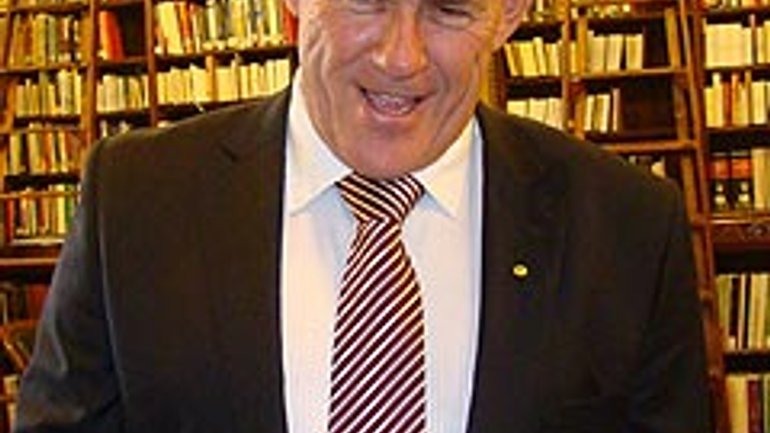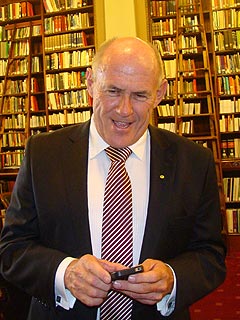Politician Stefan Romaniw: Our Parents Began Their Lives in Australia by Forming Parishes and Building Churches

 Australian politician of Ukrainian origin Stefan Romaniw is famous far beyond the “green” continent. Since 2008, he has been the General Secretary of the Ukrainian World Congress, Chairman of the Commission on the Recognition of the Holodomor as Genocide Against the Ukrainian People. He is also Deputy Chairman of the World Board of the Union of Ukrainian Youth. As a member of the Parliament of Victoria, he has worked on multiculturalism and preventing interdenominational conflict. During his recent visit to Ukraine, I had a chance to talk with him.
Australian politician of Ukrainian origin Stefan Romaniw is famous far beyond the “green” continent. Since 2008, he has been the General Secretary of the Ukrainian World Congress, Chairman of the Commission on the Recognition of the Holodomor as Genocide Against the Ukrainian People. He is also Deputy Chairman of the World Board of the Union of Ukrainian Youth. As a member of the Parliament of Victoria, he has worked on multiculturalism and preventing interdenominational conflict. During his recent visit to Ukraine, I had a chance to talk with him.
— Mr. Stefan, in the Parliament of Victoria (Australia) you work on issues of multiculturalism. How are religious problems in Australia solved?
— According to our policy of multiculturalism in Australia, the state does not interfere in religious matters. Every effort is made for various denominations to cooperate within Australia. Thus many religious councils, which include Christians, Muslims, and Jews, have been established. They converge to promote multiculturalism and religion in the country, but everyone understands that none of the churches will have an advantage over another church. That is, there is close cooperation, but that does not mean that there is no special treatment of certain churches. This mainly refers to the Muslims. Some people have reservations about this community, because they have other “rules of the game.” In some regions where Muslims are the majority, they are trying to impose their own rules, their own way of life, and it is understandable that not everyone likes it. But there have been no serious conflicts.
Recently a large Muslim forum was held in Australia. I met Muslims, representing different points of views: right-wing extremists and more moderate representatives of the Muslim community. After this forum, I understood that in Australia the majority are still moderate Muslims. They remember that they live in Australia, and that the law is in the first place.
— Are there religious conflicts in Australia?
— You know, we are trying to be proactive, that is, to predict conflicts and fight against prejudice. We have almost no conflicts. I don’t want to say that what we have is perfect, but we certainly have no conflicts at the community level.
What does our proactivity involve? I headed the commission on multiculturalism. If we see that a conflict is brewing between the churches or communities, primarily it is between Muslims and Jews, we convene a state meeting, invite representatives of both sides, and try to resolve the issue. In addition, the government has always stressed the fact that both parties are first subject to Australian laws and then to their traditions. But we don’t have people taking to the streets and creating disorder.
— Have the indigenous people, the Aboriginals, preserved their religion?
— Unfortunately, a religion as such has not survived, but they have spirituality. The indigenous population is invited to every state event, holiday, or big public event to make a traditional greeting. We recognize that they were here first, that we now live on their land. But they themselves acknowledge that only their spirituality has remained. The question of Aboriginal identity is important for the Australian government. Today, the Aboriginal language is the most critical issue for the Aboriginals, because they are losing their language.
Recently, the government apologized for what the European colonizers did with the Aboriginals a few centuries ago. But on this occasion there were disputes in society. Some feared that the natives would seek compensation, while others were convinced that the Australian society is ripe for a serious talk with the natives and that this dialogue is necessary.
— What role do the Orthodox and Catholic Ukrainian Churches play in Australia?
— You know, the first thing that our parents did when they came to Australia is begin to form parishes and build their churches. These processes we observe in Italy, Portugal, Spain, and Greece. If you visit the Greek Catholic Church in Australia, you will find a museum, group performances, and a school choir. And in the Orthodox Church the same. Very revealing in this regard is Easter. On the feast all the churches organize interesting celebrations, decorate Easter eggs, and sing Ukrainian folk songs. But is the spiritual component attractive for them? Today, most people go just for the show, for them Easter is a cultural event. Although we should not forget that the church and culture go together. For example Christmas, Christmas carols in particular. Caroling is the culture of singing, but it is also a spiritual aspect for Ukrainians.
Today, clergy members are present in the Ukrainian Council of Australia. And we may be one of the first diaspora organizations that has a constant dialogue with the churches. But earlier, even through marriage, the Orthodox were with other Orthodox, the Greek Catholics with the Greek Catholics. Today there are a lot of mixed marriages.
— Do Australian religious communities have ties with Ukrainian churches?
— There are two points. The first concerns the Catholic Church. This religious organization has a council of bishops (Synod of Bishops - DF) and they discuss common problems of Ukraine and the diaspora together. The second point is collaboration with a wider range of Christian churches, it does not matter with whom, Baptists or Anglicans, they all belong to the Council of Churches and that Council of Churches includes representatives of all faiths. The council discusses various pressing issues, such as abortion, where all the churches have a common view and can carry out joint work. There are many examples of different churches working together for the benefit of building a healthy community.
— What sort of social work are Australian churches involved in?
— It is generally public service; that is, to help a family with some difficult problems, such as alcoholism or drug addiction. There is also work with older people. Homes are constructed for the elderly. The Ukrainian Greek Catholic Church in Australia, as well as in Ukraine, has a center for sick people called Caritas, which is involved in a lot social work in different areas.
— Do young people come to the Australian churches?
— Yes, young people come to church, but much less than we would like, and much less than before. In Ukraine, in my opinion, the situation is different. Everywhere that I was in Ukraine, there were a lot of young people attending service. In Australia, unfortunately, the situation is quite different. Today we are seeing a decline. Earlier presence at worship was the law. Now, there is the argument that I do not need to be in church to prayer, or better I'll do good works than attend the service.
It is clear that in order to regularly attend church a person needs to have discipline. And it should not be only discipline that brings people to church; it must be a call of the heart. But this problem is not only in Ukrainian churches. According to our Council of Churches, other countries have also experienced this. However, things can always change. We hope for the benefit of the church.









